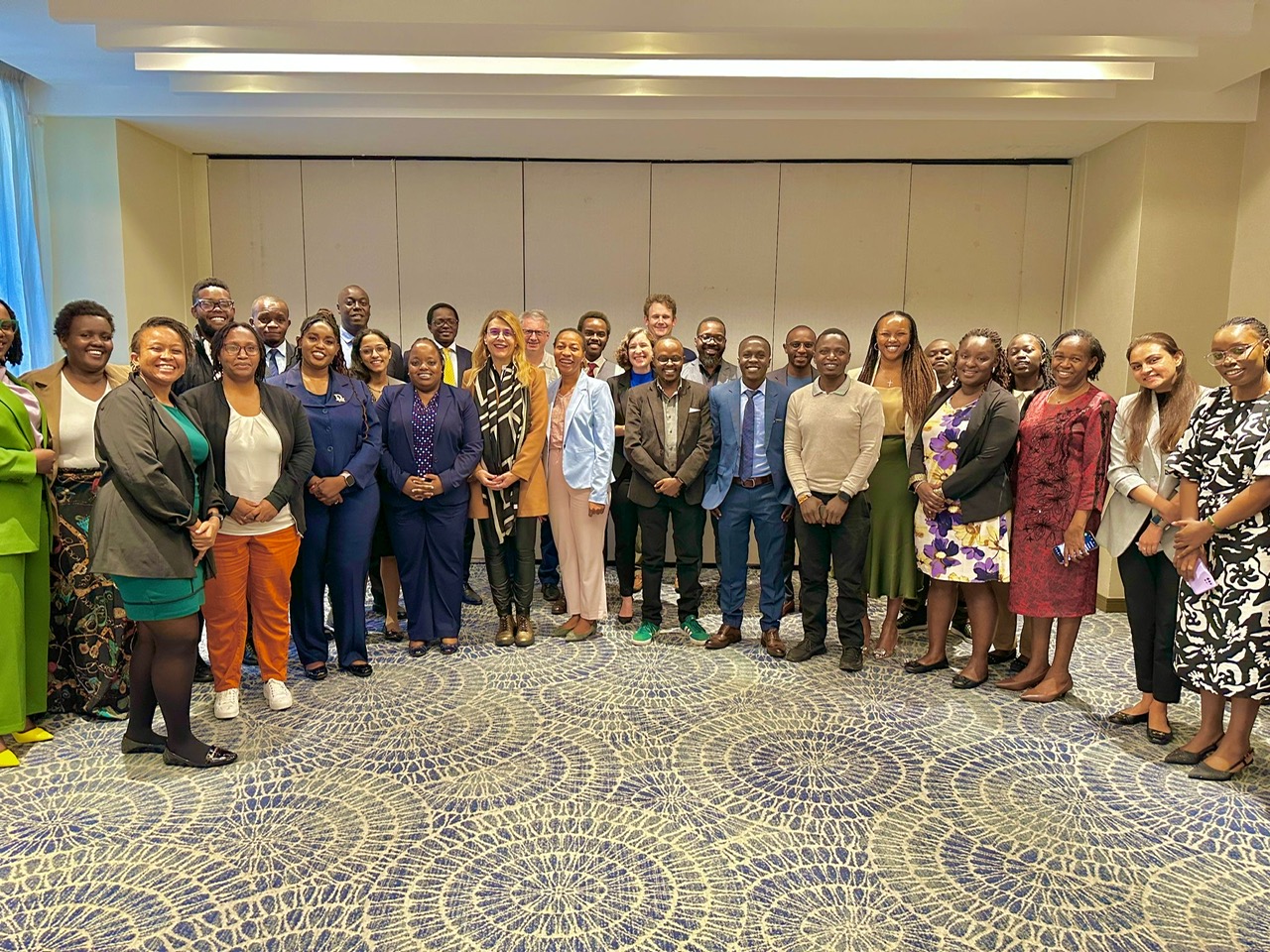We are excited to announce that Brink is now part of Africa Practice. Learn more
Africa: Tech policy trends to watch in 2024

Each year brings exciting new tech policy developments for the African continent. Artificial Intelligence (AI) has assumed crypto-levels of hype, while digital trade is introducing a myriad of new elements. From data privacy to digital infrastructure and copyright considerations, and building on predictions shared with clients last year, we outline key tech policy trends to watch in Africa in 2024:
1. AI – from theory to governed product
Last year, we predicted growth in AI and the emergence of new areas (such as natural language processing), even as digital infrastructure and governance arrangements come into focus. Importantly, we said AI itself – not the developer or operator, would come under scrutiny. We saw this play out even as the discourse around transparency, safety, and AI for development took shape, and with initiatives such as the UK AI Safety Summit where 29 countries agreed that AI posed significant risks to daily life.
In 2024, we expect to see governance arrangements for AI and related elements crystalise. The impending adoption of the African Union’s AI strategy early this year will offer a litmus test. Work is also ongoing elsewhere on the continent at the national level to emplace AI-enabling regulatory frameworks. In the pursuit for digital sovereignty, nations will begin to grapple with defining ownership and control of the massive datasets powering generative AI and other technologies, and how freely and where that data should flow.
2. The data rush – but not in the way that you think
If data is the new currency, safeguarding it is paramount. The operationalisation of the Malabo Convention, as we predicted, indicates that African nations are acknowledging the significance of establishing robust data protection and cybersecurity guidelines. In 2024, countries with weak or non-existent frameworks will strengthen them, while more advanced markets will operationalise regulations and pursue jurisprudential clarification of unclear requirements. We predict a surge in the enforcement of (new) instruments across the continent, especially where a robust legal foundation supports enforcement action. Diligent policymakers will be focused on striking the right balance between fostering innovation and trade, ensuring that individuals are protected online, and have control over their personal data. Concurrently, we expect clarity around cross-border data flows for digital trade.
3. Skilling for the future of work
We anticipate that forward thinking African governments will prioritise tech education and skills development, motivated by diverse objectives. Some governments will look to leverage their digital native population and position themselves as Africa’s outsourcing destination, while others will be looking to attract innovation-focused investment. We expect noteworthy developments out of Nigeria, Kenya, Zambia, Rwanda, and several others on this front.
4. Towards a more vibrant startup continent
Governments across Africa are increasingly recognising the imperative to cultivate environments conducive to innovation and empowering local startups. In 2024, we expect more robust endeavours to implement policies – where applicable – aimed at bolstering support for startups and tech entrepreneurs. Governments will actively explore innovative financing and regulatory mechanisms with a concerted effort to facilitate international and regional collaboration for startups. The recently launched Timbuktoo initiative is a good indicator of this focus.
5. Reality checks
Last year, we foresaw the end of “easy money” – a prediction that materialised with the closure of at least 15 African startups last year. Elevated interest rates driving up the cost of capital, easier returns at home, combined with a number of high profile governance and strategic failures have made venture capitalists (VCs) more cautious. As the cost of risk has gone up, this has translated into greater scrutiny of the startup/scaleup ecosystem. We maintain that 2024 will continue this momentum as the year of reality checks, with investors placing greater emphasis on product-market fit and early returns. This is especially important to watch, if the United States follows through on legislation to hold VCs, private equity and others, more accountable to investors.
6. Money still costs too much
Cash is still king in Africa, but digital financial flows continue to grow in importance. The continent is still keen to usher in a new intra-african trade mechanism that diminishes reliance on the US dollar – a drive which has birthed the Pan-African Payments Settlement System (PAPSS). So far, 11 countries have integrated with PAPSS, with Rwanda’s central bank becoming the most recent participant. PAPSS is now also slated to enable the expanded pilot of the African Continental Free Trade Area (AfCFTA)’s Guided Trade Initiative. Meanwhile, Kenya remains an active contender to host the PAPSS headquarters, on the strength of its potential to reverse the shilling’s performance against the dollar. Demand for a cross-border payment mechanism that bypasses the dollar is steering a sense of urgency around the comprehensive rollout and adoption of PAPSS, although implementation remains a major technical challenge.
7. Momentum builds for AfCFTA digital elements
While 2023 was the year of the AfCFTA implementation acceleration, 2024 may be the year we finally gain traction on the anticipated digital trade protocol. At the same time, however, the operationalisation of previously adopted protocols, such as the IP and competition protocols, remain pending, and unresolved questions linger on cloud and (regional) data centres, cross border data flows, amongst others. The African Union will also work towards the realisation of its Digital Transformation Strategy, which includes ambitions to develop pan-continental guidelines for startup conducive environments and data flows.
8. Consumer protection & digital accountability
We told our clients last year to expect a rise in interventions to shield consumers from exploitative digital operators. We saw that substantiated with Uganda, Kenya, Rwanda, Nigeria and other jurisdictions taking regulatory action. As the demand for convenience and affordability results in greater avenues through which individuals commit themselves to loans, purchases, contracts, and other substantial transactions, we anticipate a heightened focus on regulatory intervention and regional collaboration aimed at safeguarding consumers from regulatory gaps. Expectations on a consumer level around trust and safety online will also continue to drive wider conversations about data and content regulation at the national level.
9. Intellectual property rights and the creative economy
The rapid advancement of AI technologies presents unique challenges and opportunities for intellectual property rights. Policymakers in Africa are poised to contend with the imperative to strike a balance between enabling innovation, allowing for legitimate uses of AI-driven technologies while protecting the rights of content creators and storytellers. A central facet of this challenge involves addressing the escalating concerns of online piracy and IP infringement on digital platforms. Efforts are likely to be directed toward shifting the responsibility to intermediaries equipped with greater capabilities to monitor and regulate such infractions. On a broader scale, Nigeria and South Africa are anticipated to intensify efforts to leverage their creative economy potential.
10. African nations delay picking a side, but demand a bigger seat at the table
Akin with China’s stance on trade and investment, in the realm of tech policy, Beijing positions itself as an alternative leader. This is evident through initiatives like its World Internet Conference. However, persistent tensions with Western democracies may lead African nations to remain cautious about engaging in this dynamic – at least temporarily. Concurrently, there is a growing inclination among African nations to assert a more substantial voice in shaping global governance arrangements for tech policy. We expect major continental players to find their voice in 2024.
About the Author
‘Amaka Yvonne Onyemenam is a Senior Consultant at Africa Practice, advising on technology policy and regulation. She is also a Member of the Center for AI and Digital Policy (CAIDP) Research Group. She can be reached at [email protected].
Related articles
Proud to be BCorp. We are part of the global movement for an inclusive, equitable, and regenerative economic system. Learn more


